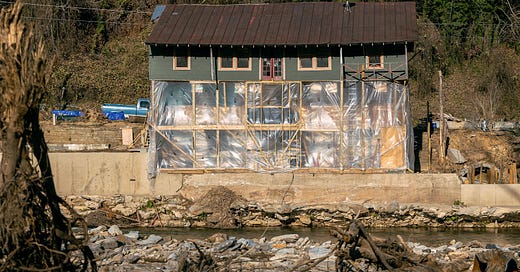Temporary housing needs remain urgent
Plus: Asheville hospital reconnects to city water supply; A Yancey County road will cost $500M to repair; Chimney Rock to reopen for 1 day
You’re reading Mountain Updates, a free pop-up newsletter from The Charlotte Ledger examining the crisis and recovery in the N.C. mountains. Ledger subscribers can add Mountain Updates on their “My Account” page.
Sign up for free:
This photo of a damaged building was taken on Dec. 1 in Bat Cave, more than two months after Tropical Storm Helene devastated Western North Carolina. (Photo courtesy of Rey Castillo Jr.)
While visiting my family in Swannanoa over Thanksgiving weekend, I couldn’t help but notice dozens of camping tents pitched along the main roads where houses once stood — tents that are serving as homes for those who lost everything in Tropical Storm Helene. As temperatures continue to drop, securing temporary housing has become a priority in Western North Carolina.
More than 530 households have been approved for temporary housing, but FEMA fell short of its goal to have 103 trailers ready to go by Thanksgiving, WRAL reported. As of yesterday, 62 mobile trailers are housing 59 families regionwide, WLOS reported, with 46 trailers recently set up in Old Fort in McDowell County.
To help speed up the process, North Carolina has introduced emergency rules to streamline building temporary housing, WLOS reported. Temporary structures now only need to meet basic safety standards, such as secure foundations, roofs and heating, bypassing state building codes and permits. Property owners can sign affidavits affirming compliance, which will expedite shelter efforts and ease pressure on inspection departments.
Over the past two months, FEMA has provided over $47 million in displacement assistance, including hotel accommodations. FEMA recently announced it would be extending its program offering temporary housing in hotels until Jan. 11, 2025. The program has supported more than 10,000 households, with more than 4,900 families still using the service, Blue Ridge Public Radio reported..
In addition, many individuals and nonprofits have donated camper trailers to families displaced by the storm and have assisted families in repairing and rebuilding their homes.
Here’s the latest news coming out of the region:
Criticism of new relief bill: N.C. House Republicans successfully overrode Gov. Roy Cooper’s veto of Senate Bill 382, which critics argue prioritizes a political power shift over hurricane relief. While the bill includes $227 million for Helene recovery, it has drawn backlash for not directly addressing immediate needs. Governor-elect Josh Stein and others criticized the bill, calling it a power grab. Meanwhile, the state’s storm damage is now estimated at nearly $58 billion, with federal relief efforts still pending. (News & Observer) You can read more about Senate Bill 382 here.
Asheville’s main hospital is back on city water: Mission Hospital and other HCA facilities resumed using Asheville’s municipal water supply on Monday, ending reliance on trucked and well water after Hurricane Helene. Independent testing confirmed the water's safety. During the storm, the hospital used 14 million gallons of alternative water sources, including 200,000 gallons daily for critical care. (Blue Ridge Public Radio)
North Fork Reservoir to get $39.2M filtration system: The U.S. Army Corps of Engineers has initiated a $39.2 million temporary filtration system for Asheville’s water supply, funded by FEMA. This system is designed to prevent future boil water notices caused by increased sediment levels in the North Fork Reservoir. The filtration setup, expected to handle up to 25 million gallons per day, includes barge-mounted pumps and flotation units to reduce the amount of sediment in the water. The system is crucial for ongoing recovery efforts, ensuring safe water for Asheville’s 160,000 customers amid potential winter storms. (Asheville Citizen Times)
One road could take $500M to repair: U.S. 19 West in Yancey County faces a repair cost of up to $500 million, with temporary fixes at $50 million. About 12 miles of the road and a dozen bridges were destroyed. The N.C. Department of Transportation plans to reopen the route to local traffic by Christmas and aims to accelerate repairs through progressive design-build contracts. Over 270 roads in Western NC remain closed post-storm. (Asheville Citizen Times)
Private bridge repairs: Nonprofit “A Bridge Home” has helped restore temporary access to hundreds of private bridges in North Carolina but estimates that nearly 20,000 private roads, culverts and bridges remain damaged. FEMA has reported over 6,000 claims for such damages, but the nonprofit believes the true need is much greater. (WLOS)
FEMA to close 2 shelters: FEMA will close two Helene Disaster Recovery Centers in Macon and Swain counties on Saturday at 2 p.m. There will still be 18 centers open in Western North Carolina. (WLOS)
Chimney Rock opens for 1 day: Chimney Rock Village, which has been closed to visitors following Helene, will host "A Christmas Event for Chimney Rock Village" on Saturday (Dec. 14), from 10 a.m. to 4 p.m. Visitors can enjoy Christmas activities at Lake Lure Inn, shuttle tours of the village and support local businesses affected by the storm. Access is restricted to N.C. 9 and U.S. 64/74A. (Hendersonville Times-News)
Checking in on Christmas tree farms: North Carolina’s Fraser fir industry faces a severe setback after Helene destroyed significant portions of Christmas tree farms, including 70,000 trees on one family farm in Newland featured in this Washington Post article. Farmers are salvaging what they can by selling wreaths and damaged trees with community support, but long-term recovery requires years of replanting and care. With limited seedlings available and substantial financial losses, rebuilding remains uncertain.
🎁 There’s still time to support WNC businesses this holiday season
◼️ This weekend, the “Potters Market” on Saturday at the Park Expo and Conference Center will feature handcrafted pottery from more than 30 Western North Carolina artists. It’s happening 10 a.m. to 4 p.m. Check it out here.
◼️ You can also shop to support Western North Carolina’s economy by using The Charlotte Ledger’s mountain gift guide, which features more than a dozen mountain businesses that offer shipping options. Click here to get your holiday shopping on.
—
Lindsey Banks, a native of the Buncombe County town of Swannanoa, is a staff reporter with The Charlotte Ledger. Reach her at lindsey@cltledger.com.
How to help
Many organizations have deployed groups across the region, tasked with distributing food, water and supplies. You can donate to their efforts at the links below.
Hearts with Hands, a local disaster relief organization, has a donation page to provide food, supplies and water.
United Way of North Carolina has established a fund to help residents affected by the flooding.
MANNA Foodbank, which serves 16 counties in Western North Carolina, is accepting food, supplies and monetary donations. The organization’s warehouse on Swannanoa River Road in Asheville was damaged by the hurricane.
The American Red Cross is accepting donations to help residents in the Southeast.
Samaritan’s Purse, which is headquartered in Boone, is scheduling volunteers to help with debris cleanup.
Operation Blessing has a donation page to provide food, supplies and water.
E4E Relief, a Charlotte-headquartered provider of emergency financial relief programs on behalf of corporations, is accepting donations for their newly established Hurricane Helene Community Fund, offering financial support to individuals with long-term impacts from Hurricane Helene.
Need to sign up for this e-newsletter? We offer a free version, as well as paid memberships for full access to all of our local newsletters:
➡️ Opt in or out of different newsletters on your “My Account” page.
➡️ Learn more about The Charlotte Ledger
The Charlotte Ledger is a locally owned media company that delivers smart and essential news through e-newsletters and on a website. We strive for fairness and accuracy and will correct all known errors. The content reflects the independent editorial judgment of The Charlotte Ledger. Any advertising, paid marketing, or sponsored content will be clearly labeled.
Like what we are doing? Feel free to forward this along and to tell a friend.
Social media: On Facebook, Instagram, Twitter and LinkedIn.
Sponsorship information/customer service: email support@cltledger.com.
Executive editor: Tony Mecia; Managing editor: Cristina Bolling; Staff writer: Lindsey Banks; Business manager: Brie Chrisman





